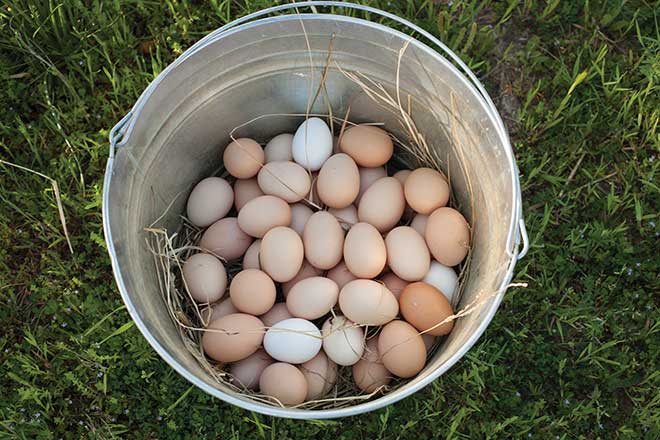I love eggs any way I can get them, and the fresher, the better. It’s one of the great benefits of raising chickens at the farm.
My fascination with chickens began as a kid. My grandparents on both sides of the family always had them, and I thought they were so cool. So I started raising some of my own. At night, I would go outside and, with the help of my brother, build cages for them. When it was time for a poultry show, my mom would load the station wagon with my birds, and off we’d go!
Today at the farm, Poultryville houses more than 60 breeds of heritage poultry. Even if you live in a neighborhood with a modest backyard, having a small flock is a worthwhile investment. Before you start, make sure to check municipal codes for rules on having chickens in your neighborhood.
By raising chickens, you’ll not only have a constant supply of eggs and meat, should you choose, but you’ll also be supporting the genetic diversity of these animals. This is critical to food security, since heritage breeds are being replaced by modern varieties for the industrial agricultural system. A great way to get to know different breeds is to visit a poultry show or contact someone from your area in the American Poultry Association (amerpoultryassn.com).
Some of my favorite heritage breeds for beginners are:
Buff Orpingtons: A beautiful, golden colored chicken, they have an easygoing disposition and are good producers of medium to large brown eggs; they are adaptable to free range and do well with confinement.
Plymouth Rocks: Good producers of large brown eggs, they adapt well to confinement or free range; they are docile, friendly and easy to handle.
Brown Leghorns: Heat tolerant, they enjoy free range but will adapt to confinement; they are heavy producers of medium to large white eggs. Free-range hens tend to lay eggs that have a richer flavor and more nutrients than most store-bought eggs, with twice the omega-3s and vitamin E, and four to six times as much vitamin D. With all your fresh eggs, give this egg salad recipe a try. Serve on toast points, bread for sandwiches or a bed of fresh greens.
classic egg salad
1 dozen eggs
¼ c. finely chopped sweet onion
1 stalk celery, finely chopped
½ c. mayo
2 T. yellow mustard
1 T. dill pickle relish
1 T. chopped olives
Salt and pepper to taste
» Place eggs in a large pot, and cover with water. Bring eggs to a hard boil for 1 minute.
» Cover pot, turn off heat and allow eggs to sit in hot water for 20 minutes. Remove eggs and place in an ice bath for 5 minutes.
» Crack and peel eggs. Refrigerate until completely cold, at least 3 hours.
» Finely chop eggs; mix in onion and celery. Add remaining ingredients and stir.
P. Allen Smith is an author, conservationist, and TV host of Garden Home on PBS and Garden Style (check your local listings). He uses his Arkansas Home, Moss Mountain Farm, to promote the local food movement, organic gardening and the preservation of heritage poultry. For tours of the farm, visit pallensmith.com/tours.
Photo at top: Jane Colclasure
